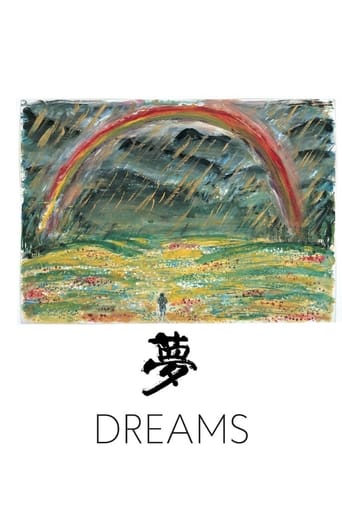Jon Corelis
Akira Kurosawa's Dreams is a melding of autobiography, zen philosophy, Noh drama, Japanese folklore, and modern anxieties about nuclear and ecological doom. It is a masterpiece by a genius director, and one of cinema's great studies in color (comparable only so far as I can think of to two much happier films, Renoir's French Cancan and Minelli's An American in Paris.) Some people have complained about the film's long periods of little or no action, an apparently simplistic morality, inaccurate science, non-realistic dance sequences, and obviously artificial special effects, not understanding that all these elements are quite deliberate stylistic features consciously employed to devastating effect by a master film maker in total control of his medium. If you don't understand this when you see it, keep watching it again and again until you do understand it. The Criterion DVD is of superb quality with a useful booklet about the film.
gemtea-2
This, for me, is one of the most beautiful films ever made. Considered by many to be 2nd rate Kurosawa, that's something I just don't buy. So many of his techniques are on display, infinity shots, close-ups, telephoto manipulations, great storytelling (for the most part) and some of the best color cinematography I've yet to see. I love this film. If critics did not know who the director was, I believe it would be considered a classic but some artists are virtually always held to expectations that are foolish. I have seen almost all of Kurosawa's films and I've never seen one I didn't like. Some are masterpieces, some near masterpieces and even his weaker ones always interesting. I was surprised how much i liked The Quiet Duel and I Live in Fear perhaps because they are not written about constantly like Ran, Seven Samurai, Yojimbo or the wonderful Ikiru.If any of his films deserved a Criterion Blu-ray release, this is it and I think it is only one of perhaps 3 that Criterion has not done. Certainly the only reason must be to do with getting the rights and not that they think it isn't deserving. It is written that Kurosawa came to color late yet he was a painter, therefore his wonderful albeit overly colorful films. Overly colorful for realists but not artists who know how to employ it with genius. It's simple, beautiful, a true piece of film art by one of the greatest directors in film history.
Jose Cruz
Akira Kurosawa was perhaps the single greatest film director in more objective terms (i.e. in terms of influence over other directors plus some other factors) and this is his final film. Showing all his virtuosity in directing, Kurosawa made a film about dreams and is a film of dreamlike quality. It is not as avant-garde and "crazy" as Tarkosvky's Zerkalo or Norstein's Tale of Tales. Instead it shows dreams as narrative in a typical Kurosawa fashion: the rational way (Kurosawa's way) of narrating irrational (i.e. dream like) events. It is a very artistic film and shows Kurosawa's admiration of painting and his expert use of colors is a product of the fact that his artistic career began in painting before turning to film.
gothic_a666
'Dreams' is a highly personal journey through the inner landscape of Kurosawa's mind. But it is also an oneiric reflection on Japan itself. True to the nature of dreams the movie is comprised of vignettes, most of which unconnected, a collection of threads of imagery that are stand alone and gain a greater sense of diversity when seen as a whole. This variety is deep and eccentric, it goes from traditional lore in the wedding of the Fox spirits to frightful scenes of nuclear disaster as Mount Fuji becomes a red cone without forgetting a gorgeous incursion into Van Gogh's vision.While artistically bold and faultless in the crafting of a dreamy mood this is not an escapist movie of pure fantasy. For there is always space of nightmares in the world of dreams. Collective phantoms that are very close to the Japanese identity reappear in novel and unpredictable ways. The horrors of the war are represented in a dead platoon that does not know of its own demise; the ever present dread of a nuclear holocaust mingles with the national icon of Fujiyama and provides ground for philosophical considerations through the narrative vehicle of folk traditions; ecological concerns in a society that is increasingly more dependent on technology are soothed by a bucolic alternative of a simpler life.Through the medium of strong impressive images Kurosawa interprets himself and his country to the world with stunning results. The movie is the culminating achievement of a master for if there ever was a masterpiece 'Dreams' is one.






